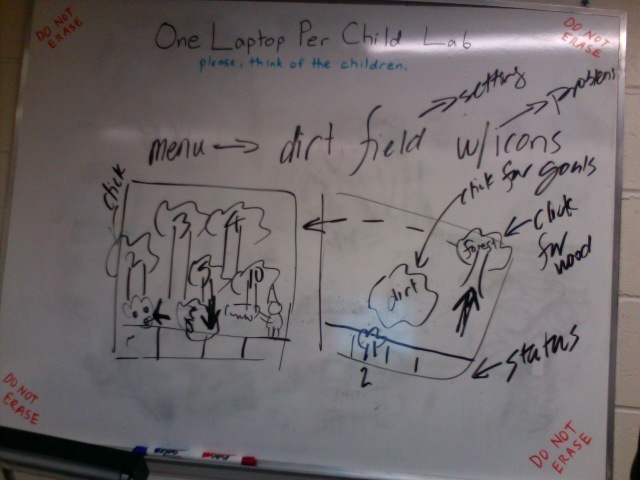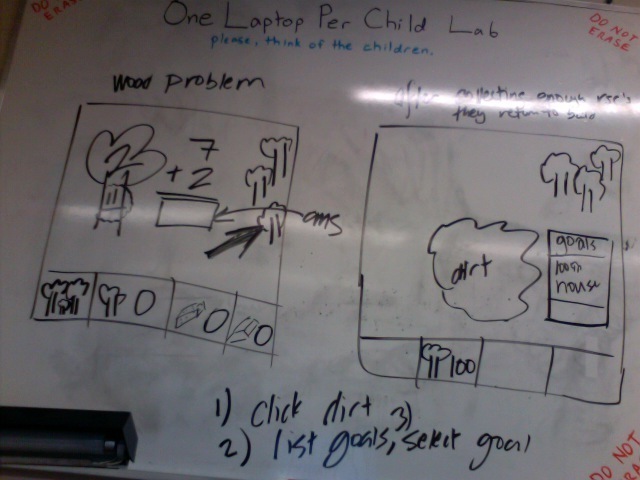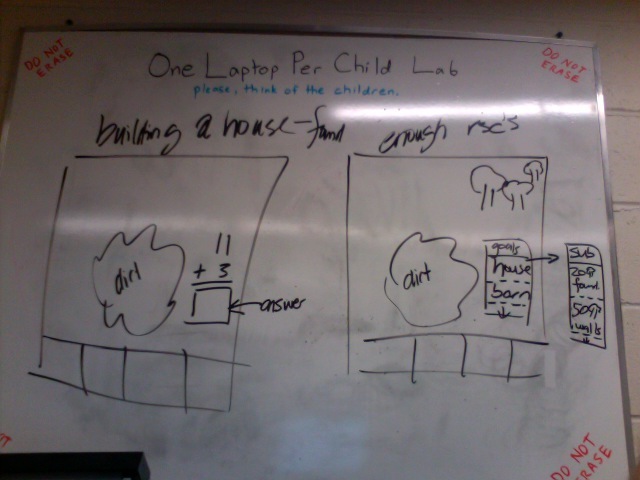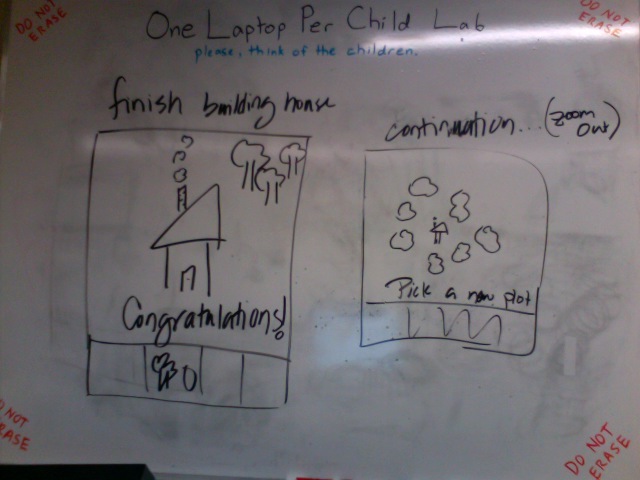RPI/Mathactivity: Difference between revisions
No edit summary |
No edit summary |
||
| (14 intermediate revisions by 4 users not shown) | |||
| Line 1: | Line 1: | ||
==Project Description== |
|||
The math activity will be designed to teach XO users about fundamental mathematical principles through a game. The game will be extensible, engaging, and challenge the user to learn new mathematical principles and complete more complicated mathematical principles. There should be no ultimate end to the game but ever-increasing difficulty to the game with a variety of rewards. |
|||
| ⚫ | |||
| ⚫ | |||
<ul> |
|||
<li>Extensible game engine</li> |
|||
<li>Ability to play across the network</li> |
|||
<li>One level (build a single house)</li> |
|||
</ul> |
|||
| ⚫ | |||
| ⚫ | |||
The primary goal of the math activity is to teach users fundamental mathematical principles such as addition, subtraction, multiplication, and division. These principles will be conferred through a game in which players work toward a reward by collecting resources. |
|||
The resources will be collected by performing mathematical equations. These will vary from the level and reward the player is trying to achieve to the setting the program is run. Similarly the mathematical equations are extensible and can be added or removed from a text file processed by our activity. This will allow game play to be expanded if the user wants to do alternative mathematical equations. |
|||
A reward is given to the user upon successful accumulation of the resources. Some examples of resources are wood, steel, and stone. At the mill, forge, or quarry (respectively) the user is then presented with math equations in which they must solve. Successful answers provides a given quantity of resources while unsuccessful answers will not give the user the quantity. Or even a wrong amount of the wanted resource. |
|||
The user must move between the various factories of resources to the desired location of the building and perform additional calculations to build the reward. At this point the level is completed and the user may continue to harder and more complex levels for even grander rewards. |
|||
Similarly the multi-player function of this activity is the same as the single-player function. Where one user may work toward a reward two users or more may work toward larger rewards. Where only a single user can build a single house a dozen users could build a neighborhood. |
|||
To keep in the spirit of the OLPC the activity will be friendly and engaging, extensible so it may be upgraded for greater challenges and levels, and multi-player so users can connect with each other to learn mathematics together and about each other. |
|||
| ⚫ | |||
To start the project it is imperative to have a durable foundation on which the rest of game can and may be expanded. It is therefore reasonable to assert that our focus will be on the core of the activity which is the game engine. |
|||
In addition to the engine, fundamental functionality must be provided for the network. So when the game begins to grow more levels and more complex math equations there will be little to no playing with network code so long as our game engine is sound and enduring. |
|||
Finally to test our engine and networking capabilities it is entirely within the initial scope to create a single level with simple graphics to satisfy this project. The single level will be the first level in a series of levels and this will be asserted through the entire project. That it can and should be expanded after this term. |
|||
| ⚫ | |||
* [http://wiki.laptop.org/go/RPI/Design Frank's thoughts] after collaboration with a friend from Game Dev club |
|||
* Treasure MathStorm type game play (never-ending and has a goal which is achieved by using math to complete sub-activities) |
|||
* Goal Based Game |
|||
**Build a town/village? |
|||
**Obtain resources by completing math |
|||
* Several levels with increasing difficulty |
|||
* Multi-player |
|||
**Neighboring towns |
|||
**Competition in development |
|||
**CAPITALISM! |
|||
==Whiteboarding== |
|||
[[Image: Whiteboard1.jpg]] |
|||
[[Image: Whiteboard2.jpg]] |
|||
[[Image: Whiteboard3.jpg]] |
|||
[[Image: Whiteboard4.jpg]] |
|||
Latest revision as of 00:25, 2 April 2008
Project Description
The math activity will be designed to teach XO users about fundamental mathematical principles through a game. The game will be extensible, engaging, and challenge the user to learn new mathematical principles and complete more complicated mathematical principles. There should be no ultimate end to the game but ever-increasing difficulty to the game with a variety of rewards.
Project Objectives
The primary goal of the math activity is to teach users fundamental mathematical principles such as addition, subtraction, multiplication, and division. These principles will be conferred through a game in which players work toward a reward by collecting resources.
The resources will be collected by performing mathematical equations. These will vary from the level and reward the player is trying to achieve to the setting the program is run. Similarly the mathematical equations are extensible and can be added or removed from a text file processed by our activity. This will allow game play to be expanded if the user wants to do alternative mathematical equations.
A reward is given to the user upon successful accumulation of the resources. Some examples of resources are wood, steel, and stone. At the mill, forge, or quarry (respectively) the user is then presented with math equations in which they must solve. Successful answers provides a given quantity of resources while unsuccessful answers will not give the user the quantity. Or even a wrong amount of the wanted resource.
The user must move between the various factories of resources to the desired location of the building and perform additional calculations to build the reward. At this point the level is completed and the user may continue to harder and more complex levels for even grander rewards.
Similarly the multi-player function of this activity is the same as the single-player function. Where one user may work toward a reward two users or more may work toward larger rewards. Where only a single user can build a single house a dozen users could build a neighborhood.
To keep in the spirit of the OLPC the activity will be friendly and engaging, extensible so it may be upgraded for greater challenges and levels, and multi-player so users can connect with each other to learn mathematics together and about each other.
Initial Scope
To start the project it is imperative to have a durable foundation on which the rest of game can and may be expanded. It is therefore reasonable to assert that our focus will be on the core of the activity which is the game engine.
In addition to the engine, fundamental functionality must be provided for the network. So when the game begins to grow more levels and more complex math equations there will be little to no playing with network code so long as our game engine is sound and enduring.
Finally to test our engine and networking capabilities it is entirely within the initial scope to create a single level with simple graphics to satisfy this project. The single level will be the first level in a series of levels and this will be asserted through the entire project. That it can and should be expanded after this term.
Design and Implementation
- Frank's thoughts after collaboration with a friend from Game Dev club
- Treasure MathStorm type game play (never-ending and has a goal which is achieved by using math to complete sub-activities)
- Goal Based Game
- Build a town/village?
- Obtain resources by completing math
- Several levels with increasing difficulty
- Multi-player
- Neighboring towns
- Competition in development
- CAPITALISM!



